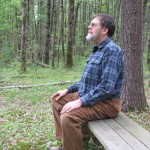Liz Opp of The Good Raised Up recently posted about how concerned she is at the difficulties that can arise when people, even caring Quaker people, try to communicate about different faith experiences. The back and forth that Peter and I have taken part in, not always calmly, seems to have been one strand in the communications that trouble her. And me… well, I’m concerned, too, because I’ve come to have a lot of respect for Liz’s grounded, open-hearted words.
This business of communicating with one another in loving openness and sensitivity–it’s definately harder than it looks. For instance, I know that, coming to Quaker ways late in life and as a member of another religious community that is often marginalized, I tend to assume that I’m the outsider in any Quaker discussion. I feel defensive at hints of difference, and I don’t always realize this. I am coming to understand that the place in the world that feels so insecure to me looks solid to others–solid enough that I can come across as the insider, shouldering others out.
I know that about my place in the Pagan world. I’m good at remembering that I’m an elder–and I think I’m pretty good at supporting people who are coming into visions different than my own there. But among Quakers…
Peter and I were constantly surprised by how little we felt marginalized at NEYM. But there were other surprises, too… There seemed to be some feelings of hurt, of feeling prepared to feel judged or condescended to, from some surprising sources. It seemed to me, for instance, that members of programmed meetings were ready to feel judged or shouldered aside by members of unprogrammed meetings. Given that the overwhelming majority of Friends’ meetings in the world are programmed–including projects that fill me with pride and hope, like the Ramallah Friends’ School–I would have predicted that it would go the other way around: I expected to find smugness on the part of programmed Friends, and to feel condescended to.
Maybe we are all sitting here, expecting to be sent out of the room by the Other Guy–the one who thinks we don’t belong here. I’m not saying there isn’t real arrogance or condescension going on–but I’m guessing there’s a lot of us responding defensively to other people’s defensiveness, and none of us even having a clue that’s what’s going on.
I saw a t-shirt at NEYM that read, “Hicksite.” I wanted one. Now I think I don’t. It’s not that I’m not proud to worship in an unprogrammed Quaker meeting… it’s that I’m starting to realize that shirt, which feels affirming and positive in my eyes, might feel hostile and rejecting in other eyes. Huh. Go figure. I’m not the only one who is afraid of being silenced?
So… Zeus and Semele. How does Greek mythology fit into this mix?
It’s like this. I’m noticing, reading some of the same threads in the blogosphere that Liz wrote about (and aware of my own less-than-perfect contributions in that department) that when we begin to communicate in ways that strike me, at least, as less open to one another, we do so with words that become more and more notional. I’m not saying that it’s wrong to discuss theology or religious history or to quote from sources that inspire us… but things seem to get off track when we begin speaking from our minds only, without consulting our hearts as well. In Pagan terms, it’s not enough to discuss the hard things from our top three chakras (crown, third eye, and throat). We need to pull the words we are taking in from others all the way down–not just to our hearts, perhaps, but all the way to the root, and let them sit there for a while, resonating. Only when we’ve had a chance to feel as well as think–in our bodies, in our souls, not just minds–are we open to hearing what’s behind the words.
And until that–? Well, as Margaret Fell said Fox asked her–what canst thou say? What can _I_ say, of my own deep experience, do I actually know of the lofty subjects being discussed?
Sometimes we talk about God/Gods/the universe as if we so thoroughly understood it all that our minds easily grasped all we say. As if any God were small enough to fit into our vocabulary and human thinking. That kind of hubris… there may be Biblical mythology that talks about it, but what I find myself thinking about is the story of Zeus and Semele.
You may know it. Semele was one of Zeus’s many human lovers. As always, Hera was deeply offended when she learned of Semele’s affair with Zeus, so she went down in disguise as a little old woman to talk with Semele. Semele told Hera that her lover was the Great God Zeus. Well, Hera managed to plant a seed of doubt in Semele’s mind, and told her, if her lover was _really_ Zeus, she should insist he prove it by appearing before her in all his glory. So, the next time Zeus visited, Semele got him to promise to do her one favor, whatever she asked, and she asked that: for Zeus to appear to her in his true glory.
When he did, of course, poor Semele was instantly scorched to ashes.
When we try to act as though the deep love affair we have with the divine is something we can contain in our mere human eyes, minds, and words, if we’re lucky, we will ourselves be scorched to ashes. If we are unlucky, we can take a whole community with us, pulled into the firestorm of thinking we own, we understand, what is really to large to be contained by words.
There’s a flip side, though. I’ve seen it at work in my own community. (I’m talking Pagan community at the moment.)
I attend an annual Pagan gathering. I won’t post the name here, because it isn’t an event so much as it is a village–it’s only open to new members who are closely connected to old ones, who invite them because they love them. This means that even newcomers are not really new–everyone who comes is part of the family. The webs of connection are deep and strong, in the way that only family can shape them. And, just as the most painful fights occur among families, our community was deeply torn by a painful dispute not so long ago.
This group has been meeting for over a quarter of a century, and the founders and those who have been part of the Pagan movement for all that time (remember–the Pagan movement, as a movement, is only 50 years old!) are treasured. Seems like everyone has one or two elders we feel especially connected to. So, when two of our most loved elders, Penny and Judy (if you’re reading this, guys, hello!) found themselves on opposite sides of a controversy in our community, and at loggerheads, it was really awful. Never mind what the controversy was–though I have my own opinions on the whole thing, there really were arguments of love and justice on both sides. What there also was on both sides was passion–gained through life experience–and a growing sense of righteousness. Not just Penny and Judy, but all of us were angry and beginning to feel that these Others we had (foolishly, apparently) called friends for so many years were being underhanded, manipulative, Bad People (not like us).
A lot of people, most especially including the two women I just named, did a lot of work to reconcile hurts. There are, I know, still tender feelings on the whole subject. But there has also been a lot of healing and compassion in the last year or two. And Judy found words to express some of how that has happened.
We had met for–believe it or not–Quaker-style worship sharing. (Peter and I have been sponsoring workshops in this format for the last few years, and it seems to be an especially Pagan-friendly technique for bringing about deep listening.) Among other things that rose in that discussion, people spoke simply and sincerely, from their hearts, on the subject of the dispute and the pain we were in because of it.
There is a Wiccan byword, a phrase that gets used to sum up what we hope to bring to or gain from our spiritual work: “In perfect love, and perfect trust.” A lot of silly things are possible, if you take that phrase the wrong way–pretending love for those in community with you when you don’t feel it, for instance, or ignoring the wrongdoing of community members for the sake of that “perfect trust.” That’s clearly not what the phrase is about, though.
I’d heard it expressed, “Perfect love _for the Gods_, perfect trust _in the Gods_” before. But Judy, I think, hit closer to the truth of it when, after sitting and listening in that spirit of reconciliation and love, said she had just realized–the “perfect trust” _isn’t_ about people being perfectly trustworthy. (That’s an unrealistic goal–even the most loving and spiritual people will let one another down. We can’t not, being people, and _not_ Gods.)
But we _can_ trust–trust that the motives of another, in community with us, are in fact good, and sincere. We can trust that, however clumsy their words are, there is something loving underneath the words that means well… even when there’s that which is painful, too. Trust–trust that the other person, deep down, is _trying_ to do right, too.
OK. She said it way, way better than that, in terms of the wording. Actually, she said it way, way better than that all around, because it was a lived experience of reconciliation and kindness, and it was absolutely sincere and spontaneous, and she gave it to us whole and from the root. I can’t possibly capture that–or even her turn of phrase–in my writing here.
But I can testify to the healing power of open-hearted listening, to heal some of the damage we’re apt to inflict on one another in our notional, I-understand-what’s-right/I-understand-God frames of mind.
This seems like a good time to say, if my words or my actions have caused you harm, readers; if my inevitable human arrogance has caused me to give you pain, I am sorry. Please let me know how I can make amends.
I will at least–at _least_-_try_ to hear you… What else can I do, to honor my teachers, Pagan and Quaker?











